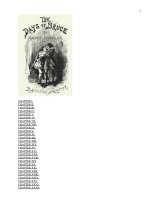Catherine: A Story
Bạn đang xem bản rút gọn của tài liệu. Xem và tải ngay bản đầy đủ của tài liệu tại đây (82.44 KB, 11 trang )
Catherine: A Story
by
William Makepeace Thackeray
Web-Books.Com
Catherine: A Story
Chapter 1..........................................................................................................................................3
Chapter 2........................................................................................................................................23
Chapter 3........................................................................................................................................31
Chapter 4........................................................................................................................................39
Chapter 5........................................................................................................................................47
Chapter 6........................................................................................................................................57
Chapter 7........................................................................................................................................70
Chapter 8........................................................................................................................................83
Chapter 9........................................................................................................................................94
Chapter 10....................................................................................................................................103
Chapter 11....................................................................................................................................111
Chapter 12....................................................................................................................................122
Chapter 13....................................................................................................................................125
Chapter 14....................................................................................................................................127
Chapter 15....................................................................................................................................131
Chapter 1
Introducing To The Reader The Chief Personages Of This Narrative
At that famous period of history, when the seventeenth century (after a deal of
quarrelling, king-killing, reforming, republicanising, restoring, re-restoring, play-writing,
sermon- writing, Oliver-Cromwellising, Stuartising, and Orangising, to be sure) had sunk
into its grave, giving place to the lusty eighteenth; when Mr. Isaac Newton was a tutor of
Trinity, and Mr. Joseph Addison Commissioner of Appeals; when the presiding genius
that watched over the destinies of the French nation had played out all the best cards in
his hand, and his adversaries began to pour in their trumps; when there were two kings
in Spain employed perpetually in running away from one another; when there was a
queen in England, with such rogues for Ministers as have never been seen, no, not in
our own day; and a General, of whom it may be severely argued, whether he was the
meanest miser or the greatest hero in the world; when Mrs. Masham had not yet put
Madam Marlborough's nose out of joint; when people had their ears cut off for writing
very meek political pamphlets; and very large full-bottomed wigs were just beginning to
be worn with powder; and the face of Louis the Great, as his was handed in to him
behind the bed-curtains, was, when issuing thence, observed to look longer, older, and
more dismal daily. . . .
About the year One thousand seven hundred and five, that is, in the glorious reign of
Queen Anne, there existed certain characters, and befell a series of adventures, which,
since they are strictly in accordance with the present fashionable style and taste; since
they have been already partly described in the "Newgate Calendar;" since they are (as
shall be seen anon) agreeably low, delightfully disgusting, and at the same time
eminently pleasing and pathetic, may properly be set down here.
And though it may be said, with some considerable show of reason, that agreeably low
and delightfully disgusting characters have already been treated, both copiously and
ably, by some eminent writers of the present (and, indeed, of future) ages; though to
tread in the footsteps of the immortal FAGIN requires a genius of inordinate stride, and
to go a-robbing after the late though deathless TURPIN, the renowned JACK
SHEPPARD, or the embryo DUVAL, may be impossible, and not an infringement, but a
wasteful indication of ill-will towards the eighth commandment; though it may, on the
one hand, be asserted that only vain coxcombs would dare to write on subjects already
described by men really and deservedly eminent; on the other hand, that these subjects
have been described so fully, that nothing more can be said about them; on the third
hand (allowing, for the sake of argument, three hands to one figure of speech), that the
public has heard so much of them, as to be quite tired of rogues, thieves, cutthroats,
and Newgate altogether;--though all these objections may be urged, and each is
excellent, yet we intend to take a few more pages from the "Old Bailey Calendar," to
bless the public with one more draught from the Stone Jug:*--yet awhile to listen,
hurdle-mounted, and riding down the Oxford Road, to the bland conversation of Jack
Ketch, and to hang with him round the neck of his patient, at the end of our and his
history. We give the reader fair notice, that we shall tickle him with a few such scenes of
villainy, throat-cutting, and bodily suffering in general, as are not to be found, no, not in--
; never mind comparisons, for such are odious.
* This, as your Ladyship is aware, is the polite name for Her Majesty's Prison of
Newgate.
In the year 1705, then, whether it was that the Queen of England did feel seriously
alarmed at the notion that a French prince should occupy the Spanish throne; or
whether she was tenderly attached to the Emperor of Germany; or whether she was
obliged to fight out the quarrel of William of Orange, who made us pay and fight for his
Dutch provinces; or whether poor old Louis Quatorze did really frighten her; or whether
Sarah Jennings and her husband wanted to make a fight, knowing how much they
should gain by it;--whatever the reason was, it was evident that the war was to continue,
and there was almost as much soldiering and recruiting, parading, pike and gun-
exercising, flag-flying, drum-beating, powder-blazing, and military enthusiasm, as we
can all remember in the year 1801, what time the Corsican upstart menaced our shores.
A recruiting-party and captain of Cutts's regiment (which had been so mangled at
Blenheim the year before) were now in Warwickshire; and having their depot at
Warwick, the captain and his attendant, the corporal, were used to travel through the
country, seeking for heroes to fill up the gaps in Cutts's corps,--and for adventures to
pass away the weary time of a country life.
Our Captain Plume and Sergeant Kite (it was at this time, by the way, that those famous
recruiting-officers were playing their pranks in Shrewsbury) were occupied very much in
the same manner with Farquhar's heroes. They roamed from Warwick to Stratford, and
from Stratford to Birmingham, persuading the swains of Warwickshire to leave the
plough for the Pike, and despatching, from time to time, small detachments of recruits to
extend Marlborough's lines, and to act as food for the hungry cannon at Ramillies and
Malplaquet.
Of those two gentlemen who are about to act a very important part in our history, one
only was probably a native of Britain,--we say probably, because the individual in
question was himself quite uncertain, and, it must be added, entirely indifferent about
his birthplace; but speaking the English language, and having been during the course of
his life pretty generally engaged in the British service, he had a tolerably fair claim to the
majestic title of Briton. His name was Peter Brock, otherwise Corporal Brock, of Lord
Cutts's regiment of dragoons; he was of age about fifty-seven (even that point has never
been ascertained); in height about five feet six inches; in weight, nearly thirteen stone;
with a chest that the celebrated Leitch himself might envy; an arm that was like an
opera-dancer's leg; a stomach so elastic that it would accommodate itself to any given
or stolen quantity of food; a great aptitude for strong liquors; a considerable skill in
singing chansons de table of not the most delicate kind; he was a lover of jokes, of
which he made many, and passably bad; when pleased, simply coarse, boisterous, and
jovial; when angry, a perfect demon: bullying, cursing, storming, fighting, as is
sometimes the wont with gentlemen of his cloth and education.
Mr. Brock was strictly, what the Marquis of Rodil styled himself in a proclamation to his
soldiers after running away, a hijo de la guerra--a child of war. Not seven cities, but one
or two regiments, might contend for the honour of giving him birth; for his mother, whose
name he took, had acted as camp-follower to a Royalist regiment; had then obeyed the
Parliamentarians; died in Scotland when Monk was commanding in that country; and
the first appearance of Mr. Brock in a public capacity displayed him as a fifer in the
General's own regiment of Coldstreamers, when they marched from Scotland to
London, and from a republic at once into a monarchy. Since that period, Brock had
been always with the army, he had had, too, some promotion, for he spake of having a
command at the battle of the Boyne; though probably (as he never mentioned the fact)
upon the losing side. The very year before this narrative commences, he had been one
of Mordaunt's forlorn hope at Schellenberg, for which service he was promised a pair of
colours; he lost them, however, and was almost shot (but fate did not ordain that his
career should close in that way) for drunkenness and insubordination immediately after
the battle; but having in some measure reinstated himself by a display of much gallantry
at Blenheim, it was found advisable to send him to England for the purposes of
recruiting, and remove him altogether from the regiment where his gallantry only
rendered the example of his riot more dangerous.
Mr. Brock's commander was a slim young gentleman of twenty-six, about whom there
was likewise a history, if one would take the trouble to inquire. He was a Bavarian by
birth (his mother being an English lady), and enjoyed along with a dozen other brothers
the title of count: eleven of these, of course, were penniless; one or two were priests,
one a monk, six or seven in various military services, and the elder at home at Schloss
Galgenstein breeding horses, hunting wild boars, swindling tenants, living in a great
house with small means; obliged to be sordid at home all the year, to be splendid for a
month at the capital, as is the way with many other noblemen. Our young count, Count
Gustavus Adolphus Maximilian von Galgenstein, had been in the service of the French
as page to a nobleman; then of His Majesty's gardes du corps; then a lieutenant and
captain in the Bavarian service; and when, after the battle of Blenheim, two regiments of
Germans came over to the winning side, Gustavus Adolphus Maximilian found himself
among them; and at the epoch when this story commences, had enjoyed English pay
for a year or more. It is unnecessary to say how he exchanged into his present
regiment; how it appeared that, before her marriage, handsome John Churchill had
known the young gentleman's mother, when they were both penniless hangers-on at
Charles the Second's court;--it is, we say, quite useless to repeat all the scandal of
which we are perfectly masters, and to trace step by step the events of his history.
Here, however, was Gustavus Adolphus, in a small inn, in a small village of
Warwickshire, on an autumn evening in the year 1705; and at the very moment when
this history begins, he and Mr. Brock, his corporal and friend, were seated at a round
table before the kitchen-fire while a small groom of the establishment was leading up
and down on the village green, before the inn door, two black, glossy, long-tailed,
barrel-bellied, thick-flanked, arch-necked, Roman-nosed Flanders horses, which were









